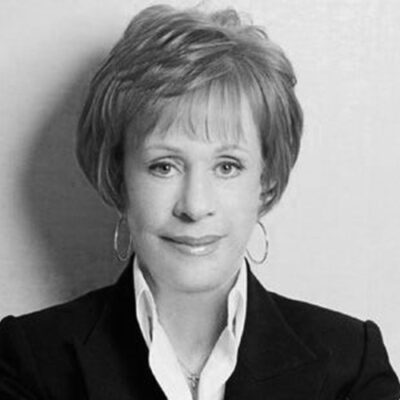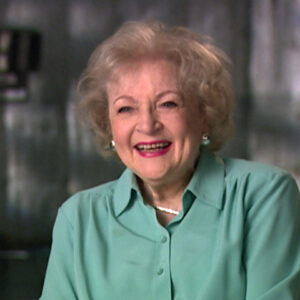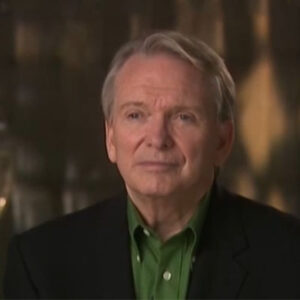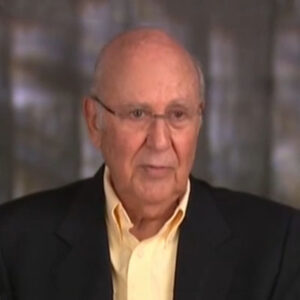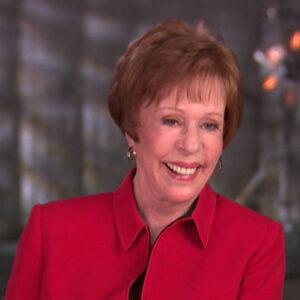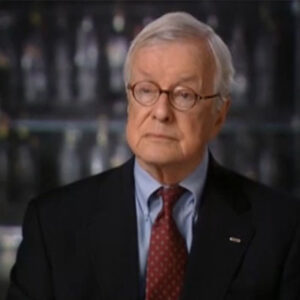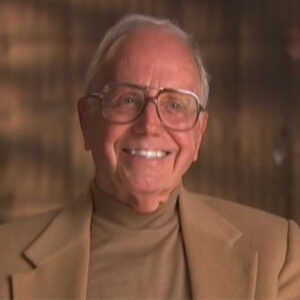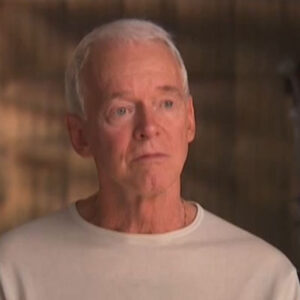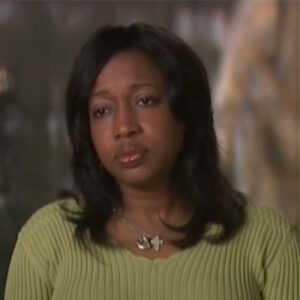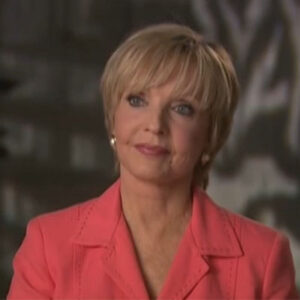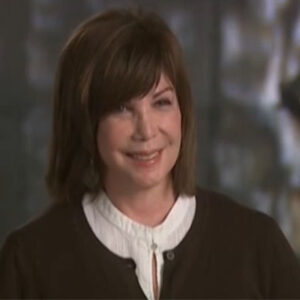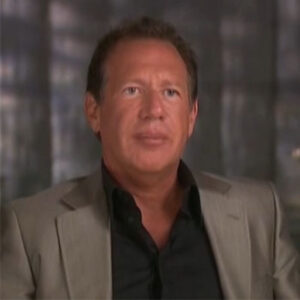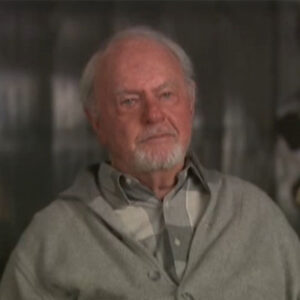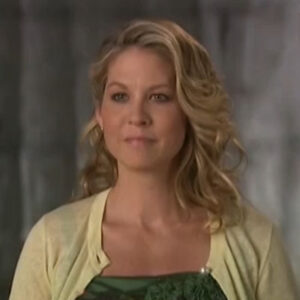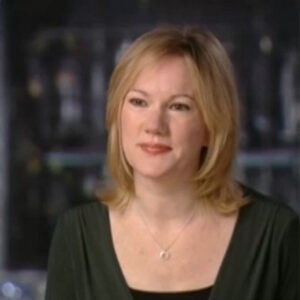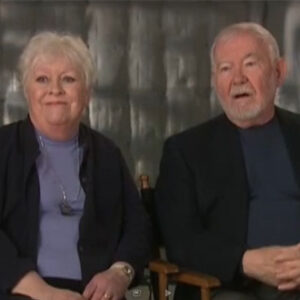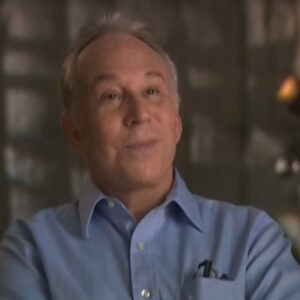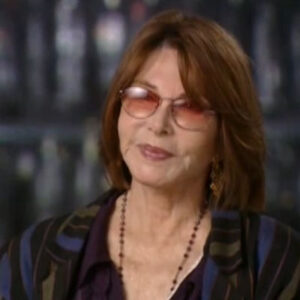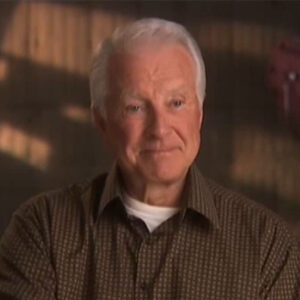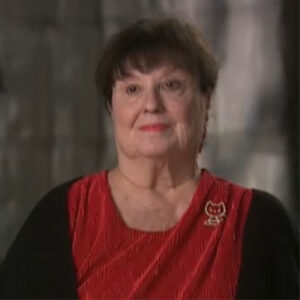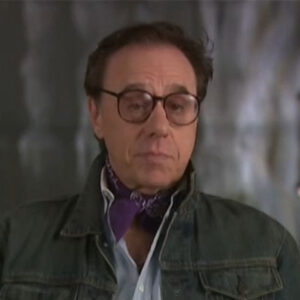Harold Prince: Oh, sure. Well, I was in the Abbott office. I mean, we were we I was already a producer and the Eckert’s produced that show, Bill and Gene. And I was it was under the same roof as the office that I had. So I was well aware when the project appeared. Mary Rogers and Marshall Barr were all friends, Mary Rogers remains one. And so, I mean, the whole thing was it was very close. And I watched it and I saw it start at the Phoenix. And it was a hit from the first moment. And it was really adroitly staged. And the design was great and the materials wonderful. It’s just a great show. And Carol was instant big star, as she deserved to be.
Interviewer: What do you think it was about? Is that true? That didn’t make her a star. What was it about her? Perfect.
Harold Prince: Well, she’s a funny lady. You know, Carol would be the first to say what she is is an actress. And so at the heart of everything that makes you laugh is something real. And and so Winifred, I guess, was the character she based everything that ultimately was funny on on a real person and a goofy personality and wonderful she was. There’s not nobody quite like Carol. She’s absolutely all these years later, there’s Carol and there’s nobody like her.
Interviewer: In what way? In the fact that she combines.
Harold Prince: Well, I you know, I mean, I it there’s the thing I touched on. There’s that thing about calling someone, quote, a comic. Well, of course, she’s comical and she’s a comic and she can take any any situation which is inherently can make you laugh and and she can do that. But inherently, she’s an actress. And. And so the nature of what’s happening is deeper and not helter skelter and haphazard. It’s it’s it’s founded on something. And she’s proven that in later years she’s done very dramatic roles beautifully and. She’s not. She’s she’s not. Quote, A stand up comic, as we have have come to know more and more of them.
Interviewer: You think she was different than a lot of the other women in musical comedy at the time?
Harold Prince: Oh, sure. Well, Carol has all these talents. She sings great. She moves really well. I think I think of all of the ladies at that point, you know, many of them were much older than she and proceeded or, you know, Mervyn and Martin and so on. And then she came along and and she but she managed to keep her tradition going, which is what we call musical comedy. There’s less of that now.
Interviewer: Ken Welch was talking about a lot of the parts that might have suited Carol at that time were written for older women. And I’m wondering if.
Harold Prince: I suppose I don’t know, I would I would take I would take issue with that because she was she was so young. She seems she seems to always seem very young. The thing about that you have to remember, was that some years earlier, Annie Get Your Gun was a huge success. She would have been very good in that. By the way. And Ethel Merman was an established huge Broadway star. But that show opened early in the evening with Annie Oakley and her brothers and sisters. And I don’t know how old Merman was. I don’t want to malign her, but she has to have been in her somewhere and now in the forties.She’d been around a long time and she didn’t look younger. And there she stood singing You can’t get a man with a gun to a bunch of kids all the way down to a like a four year old. And they were her brothers and sisters. And, you know, we we. She was so good and so persuasive and funny and the material so brilliant that you’d never bothered to question the fact that she was old enough to be their mother.
Interviewer: Do you think that Mattress at that time in terms of looking at sort of the musical comedy landscape? What was on Broadway at the time? Was it sort of fit right in?
Harold Prince: Sure. No, I think what I think Mattress is just good material. Good. There’s always time for good material. And there was good material and an a person in the leading role who was able to take it and soar and fly. What’s what’s what’s interesting is it has been done since and and by extremely talented ladies. But no one’s no one’s come come close to getting it as she did. So that that’s what makes her Carol Burnett and someone else not Carol Burnett.
Interviewer: We’re going to be showing clips from it. So I’m wondering if there’s any favorite scenes.
Harold Prince: Oh, it’s always it’s always the same number. “I’m Shy” because it’s just a great piece of material and and beautifully delivered. But, you know, there are 50 iconic moments not in that show in her career that that you’ve seen never to tire of seeing. Scarlett O’Hara would be one. You’ll show that for damn sure. And the fact is, I mean, you know, you you anticipate it coming and then you crack up as she makes her way down the stairs. Please.
Interviewer: Do you remember the story of Mattress? I went through an interesting sort of tour around New York. I was wondering if you know anything.
Harold Prince: I don’t know anything about it.
Interviewer: They had actors on strike.
Harold Prince: I don’t remember any of it. Somebody did. And told you about it. I don’t remember any of it.
Interviewer: We’re doing Dean Fuller, later. Right. Anyway, did you also happen to see her other Broadway production?
Harold Prince: Yeah. Fade out. Fade in. I saw that again. I was. What happened was I started as an office boy for Abbott and I ended up being a producer of shows he directed. And then I ended up being a director in my own right. And but we kept sharing offices. And until he died, his name was on the front of the door. A little bit grisly, perhaps, but I kept his name on the front of the office. Years after he died. And then we moved offices. And then it seemed like maybe I was getting macabre. So that didn’t happen anymore. But no, I knew that I fade out, fade in. I remember seeing very well I knew all the principals involved in writing it. And Jack Cassidy, I knew well and had a career with subsequently. So I remember that.
Interviewer: Can you talk about Carol?
Harold Prince: Oh, she was. She was truly, really funny and really good and and really, I guess was a painful experience because it’s a show that was a hit. My memory is that she went away and then she came back. But it was too, too late to come back. Or maybe she went away, came back and got pregnant and had to leave again. I don’t really remember the facts, but I do know that that the show probably would have run as a hit, real hit if the circumstances hadn’t done that to it.
Interviewer: Did you know her personally?
Harold Prince: Well, I knew her the way, you know, I knew her when she did Mattress. She says somebody you meet and you’re on your own course somewhere and she’s on hers. And we met she was always extremely friendly and nice, but I didn’t really meet her until years later at a dinner party at Beverly Sills. And my wife was not feeling well. So she wasn’t there. I was there. And she was there with a fellow named Kenny Solms, who is one of the funniest people alive and one of her closest friends. And we were seated next to each other. And I was talking about a house we had in Mallorca and had had ultimately we had it for 20 years, raised two kids there and so on, a wonderful place. And and I and I said exuberantly, you really should come and visit. And they did that very summer. They came and. And what’s memorable about is, first of all, I love the nerve. I said it. I really meant it. But you don’t know that. People are gonna say, yes, they came. And and there was a moment when Judy Prince and Carol locked eyes and said, I don’t believe we’re doing this, said Carol, but we loved having them there. And it turned out to be in 20 years the craziest heatwave in history. I think the temperatures were well over 100. And there is no air conditioning or was no air conditioning in Mallorca and we were going nuts. So I bought an air conditioning unit from a restaurant which was large enough to air air condition, a restaurant that seats 200 people. And we put it in our bedroom and we all spent all the time sitting in front of it. It was like the Arctic. And then I vividly remember saying, look, guys, we can put mattresses on the floor and you can sleep here. We’ll all just sleep in this room and in this air conditioning. And they said no, but Carol said. But I’ll tell you what, when we’re ready to go to sleep, we’re running to our rooms. I’m going straight to sleep and hoping it works. Which is precisely what happened. And that was the beginning of a long, close friendship. And we have remained friends in touch all the time since then.
Interviewer: Tell me, what does a person need to be a musical theater star? What quality does a person need?
Harold Prince: Star is such a funny word. Because that’s the one element that is indefinable. What what’s definable is you need. You need to be talented. You need to be creative. You need to be able to sing. You need to be able to move. You need be able to act character more now than in the old old days. And where you could plant your feet. And although I always thought Merman was a better actress than she ever got credit for. The fact is you need to do all those things. Then you get to the star quality things. Star quality thing, I think is a combination of what you’re born with and the difficulties of your youth. What you have to get through, because that shows, oh, I think everything shows. I think I think that that depth is probably a large part of what informs what finally becomes called star quality. The journey you’ve taken that no one has seen your your family life and Carol’s family life has now been made public in that I thought wonderful play that she and Carrie wrote and. And it was not an easy one. And she emerged from that. And so she has uncommon resilience. She’s the kindest person. You must be having a hell of a hard time talking about Carol Burnett for this show, because usually if you dig, you can find something. And that rounds out the picture in an unpleasant way. At least. There isn’t anything. She’s just doing. And I think she’s the only person we ever know who’s just everything you see is who she is. And everything you see is kind and wonderful and open and and oddly unaffected and undemanding. And that manifests itself in when you walk with her. We’re sitting in an office that I’ve spent a lot of time with her. And then she’ll say, I’ll say I’ll. Where are you going from here? And so I’m going back to the apartment and I’ll say, I’ll walk you or half way and we’ll go down the elevator and a crowded elevator. And there may be somebody who thinks that’s Carol Burnett and she hasn’t put a babushka on and she hasn’t anything. But they respect her privacy. And at the same time, they don’t treat her like most celebrities are treated. She’s treated like a relative that you love. People feel like no or, you know, it’s the old corny ones. She’s been in their home and they don’t realize that she hasn’t actually been in their home. And and so when you walk on the street, some people turn. Some people come up and say, hi, Carol. She says hi. If she looks like she’s open to be stopped and they want to, they’ll stop her. But if if she can if they see that she’s involved or engrossed or something, they absolutely leave her alone. But she’s kind to absolutely everybody. And it is not one of those lives where you feel like, oh, God, the paparazzi are gonna drive this woman crazy. I’ve never observed that.
Interviewer: You mentioned that there’s no. Just one last thing on that, you’re saying that she doesn’t really have a dark side, but she doesn’t have a lot of depth.
Harold Prince: She has a lot of depth and she has a lot of serious issues. I don’t think life is all a bowl of cherries, and I don’t think she would as she’d be the first to say it isn’t. What. What I’m really saying is. She doesn’t share her prob. She doesn’t wish her problems on you. And she does not seem egocentric, centered on her own ego. Really? That’s what I mean. It doesn’t mean there aren’t there aren’t dark shades. To what? Cause you kind of had that background and then wanted to put it on paper and then wanted to put it on the stage and and observe it and see it. I hope one of these days and believe fervently that it’ll make its way to the screen, maybe the small screen. It deserves to. It’s beautifully written. And it was it was it’s odd. I always tried to to figure out why the show didn’t do better. But my my instinct is, you know, it got mixed reviews, some quite wonderful. And there’s a Tony for one of the lead performances. But really, I think a lot of what affects. The life of a piece in the theater is the identification that either the playwright, the character has in the public mind and you say Carol Burnett. And people want to laugh. And though there was plenty of humor in this show at heart, it was a very serious, sad story. And and I think that’s ultimately what people did not want to accept from it. They will if it if it gets goes the next place on film. And it’s that well-written and structured. I think it will.
Interviewer: Tell me how Hollywood Arms came to be and it was based on?
Harold Prince: Well, what happened was that she and Carrie had been working on a play, the story of her her grandmother who raised her. Carol’s grandmother and her mother, who was an alcoholic and gorgeous woman, really a real moviebBeauty. And they lived in Hollywood. And she went to school there and and. The story is is is, you know, an alcoholic father who and they were separated or divorced and so on. Very difficult. And the grandma raised her and the stories are all fun, but the heart of the stories is dark and troubling. And the two ladies decided to write and make a play of it. And and then they went to Sundance and had a reading and it went quite well. And then Carol said, I want I wonder if you’ve read something for us and recommend a director. And I read it and I said, this is embarrassing, but because because you’re free to say no. But I’d like to pursue this with you. I think it’s it it’s it’s really quite wonderful. And we did. And then somewhere along the way, Carrie got really sick. But she she lived long enough to know it was it was happening. And. And she was she was kind of amazing, bubbly and indomitable and strong. And she had a very quirky, creative imagination. So that actually when she was sick, she spent a lot of time worrying about the nurses and the people around the hospital who were worrying about her. There’s a story that probably came up already. I don’t know about her getting a one of those mirrored balls and and hanging it in in her hospital room, which is a definitive Carrie Hamilton.
Interviewer: Can you talk a little bit about what it was like for Carol to. We’re going through this, trying to get this on on the stage at the same time.
Harold Prince: It must must have been hell. But. I think part of her strength. She’s a very strong person and she had to be from from the beginning of her childhood. I think because of Carrie’s presence in the project and because of how important she was to it, I think for Carol, it was very important that she. That she. Stay strong and get this show on and do the rewrites that were necessary. She’s very creative about rewrites and very good at writing them. And I think that was a little fearful for her because she she was having to write alone when she hadn’t written alone before. But that happened. We were in Chicago. And I say to her, do you think. Take a look at or she’d say, I’m wondering about that scene. And then she’d go away and in a room. And and I would think the assignments were going to take a couple of days. I’m very I’m rather patient. And I thought this is huge what I just said to her. And then she would go away, we’d have dinner and she’d go to a room. And then at 2:00 in the morning, I’d hear a noise. I was asleep and I’d just opened one eye and under the door would come sliding new pages and we’d put them in the show.
Interviewer: Do you think that work was kind of a refuge for her?
Harold Prince: Sure. It has to be, I think. I think her career was a refuge. For a long time, I mean, just seeking a career was a refuge. But she finds joy in things. She found joy in the Rehearsal Club. And also she had what’s common to a lot of people who ultimately make the careers they want. She had a creative imagination. She knew that it wasn’t going to come and no one’s going to knock on her door and say, hey, come out here, you’re a star. But she took the rehearsal club situation and turned that into a show, invited agents and and everything followed from that. That’s not uncommon to people who really, really, really, really know how much they want a career doing what they want to do.
Interviewer: Is she driven?
Harold Prince: Driven is is such a loaded word. Ambitious. Is is just just plain a better word and probably means the same thing. Driven implies probably and accurately that you do a lot of stepping on people to go somewhere. I don’t believe that’s in her character at all. I don’t think she ever did that.
Interviewer: Do you mind just explaining. At what point in the process where you were in the process when Carrie did pass away?
Harold Prince: I think we’d already. Booked the Chicago booking. I think we knew we were going going to the Goodman. I guess I saw it coming. I just remember there was the phone call. I can’t be more explicit than that because I don’t know. It was it was attrition. It happened. It happened in stages, but it happened quickly. And I suppose that’s good. But I think what a devil of a thing to do, you know. It’s a cliche. When a child dies before a parent.
Interviewer: Do you remember the phone call that you got??
Harold Prince: Well, I do, yeah, I don’t. Not not more explicitly than that. I guess I could see it could sort of see it coming. I just. I just. Very, very hard to. Remember anything about Carrie Hamilton that wasn’t. Bubbly and resilient. And I think she probably turned what we would term a tragedy into something where she was concerned with other people and and keeping that bubble in the air.
Interviewer: What were what was Carrie and Carol’s relationship like? Can you talk about that?
Harold Prince: Well, I think I was very there was a lot of laughing and a lot of back and forth. I do not know. Obviously, there was a time before when it was very difficult because Carol and she would appear on television talking about drugs and kids and drugs. Drugs were I suppose they still are. I’m just an older guy. But in that time, it seemed like so many of my friends had kids with problems with drugs. And my kids didn’t thank God. But I remember them saying that there were people in school, in their very class who who were on drugs. And so I. The luck of of of avoiding it and not going along with the gang and not getting suckered into it.
Interviewer: You know, when Carrie passed away, he was there a period where Carol said, this is on hold.
Harold Prince: I don’t remember that. I don’t remember. I don’t I don’t remember that there was any any hiatus where we just I think we we were on a on a on some kind of schedule and we followed it.
Interviewer: That’s pretty remarkable.
Harold Prince: She would just I think everything has to do with a sense of responsibility to her co-author. You bet. And that that’s that’s right. But unusual. It’s very unusual, but it was. But it’s correct. She tell you about the apartment at all? Well, there was there was an apartment that she was raised in. Not far from Vine. And and so I was out in California and I said, I’d like to see it. And she said, let’s go look at it. And she she paid a month’s rent from the person who owned the building or ran the building for us to have one hour looking at her old apartment. And and we got there and it was a great protective iron gate because the neighborhood was so sleazy. So right below the Hollywood sign. And we got out of the car and went to the gate. And then we went in and we were allowed in. That’s all they just said, come on in. And we went to the apartment, which was I think my memory is on the first floor. And it was very small. There was a a living room and a bedroom and a bathroom, and there was almost no furniture left in it. Look look really sad and looked out on a wall with a tiny grass plot between that building and the next one. And. And while we were there, not only did I notice in the bathroom a syringe that someone had used, but we saw a drug fix happening. We saw someone come in with a bicycle and put the bicycle down the end of the hall and go upstairs with somebody was with them who obviously sold them drugs and then went right away. All of that in just a short time. Then we up went up on the roof and looked at that. And all of that became very useful in getting the show designed for the stage. Subsequently, I got a call from Carol and she said, and it really was four to six weeks later, the building’s been sold. A young man has taken it and he’s and he’s taken away the fence and he’s putting in nice yuppy, if that phrase still works, couples and and painted the whole place. And then you should see it. It’s unbelievable the change in a month’s time. And we had taken pictures of each other in the old apartment. Then she went and then she said, I’m renting my old apartment for six months. And I said, holy cow. And I could see what that was, that was some kind of closure. And I said, what are you going to do with it? I said, well, I’m going to take the girls there and we’ll open a bottle of champagne and I’m going to put a computer there. And a little bit of furniture that I have in the cellar. And then when I’m that’s over, that’ll be over. So she she did. And the building was restored as that whole neighborhood has become. And at the end of that story is simply that she did take the girls there. I, I, I don’t remember whether Carrie was still alive. I think she may well have been. You’ll find out. But what happened was they all went there and she brought the bottle of champagne and it was a torpid, hot day and there was no air conditioning. And she’d forgotten to maybe she’d put that up, put in some air conditioning. So they just sat there for a very short time and and clinked glasses and got the hell out of there and say, same thing.
Harold Prince: Hollywood Hollywood Arms is is is based on the memoirs that Carol wrote that Carrie said, you know, there’s a play in these. I did not. I got I read the memoirs after the fact, but I read the plate first and went to work from there. But they had done they done some readings of it and so on. But it’s a very complex family story because you really do like everyone. The crustiest of them all was grandma. And she had a huge influence on Carol because she raised her and down and her mother, who was this exquisite up, a woman who is an alcoholic, lived down the hall in her own apartment and had a boyfriend there who in the play was a nice guy, a really nice guy. And and her father came and visited. And in the play, he arrives with a bottle in a brown paper bag. But he was he was good. Good people. Not bad.
Interviewer: Yeah, I think that’s true. I mean, that was despite all the dysfunction, there was a lot of love.
Harold Prince: Yes. And this is a scene in the hospital where where where she went to went to visit him before he died. But, you know, it’s. That’s where all the grit and but it’s also where and I think the plaited that it’s also whether the kindness came from there was a degree of of of. The lack of attention paid by her mother and her irresponsibility. But there was a kindness, no question.
Interviewer: What was it like for Carol to see these scenes of her life?
Harold Prince: Noises, tell em to be quiet.
Interviewer: Thank you.
Harold Prince: We’re filming.
Interviewer: Thank you. OK. What was it like to see these painful things come to life on stage?
Harold Prince: I, I watched Carol watching it. Of course, obviously we were in rehearsal every day and she would sit there and she would be very informative and helpful. Linda Lavin played her grandmother. And Linda Levin is is one of the best actresses that ever lived. And one of the most creative. And she was she was there was an easy rapport with the company with three generations of women, you know. That was quite wonderful. But the thing is that that. I guess the question that you’re that’s on the table is, did I. Did I ever see her emotionally go? If so, I’ve forgotten. I could. I’m forgetful. But that was not. There was no sense of prevailing sense of of her. She didn’t break down.
Interviewer: I guess it didn’t seem at all, did she ever talk about it? It was cathartic.
Harold Prince: I, I don’t I don’t recall a conversation which Carol said it was cathartic that she did the play. It has to have been it has to be cathartic that you get that story out there, not out of your system, but out there. Absolutely. Because there’s what’s the phrase too good to be true. She she’s not too good to be true, but she is clearly tempered the way steel is by adversity and by riding over it. But she’s made almost everything that’s happened. It’s all gone through some kind place and funny place. There was a time you’ll hear more about it from other people, I suspect maybe from Carol herself when she was an usher. It wasn’t the Pantages, but it was on that same block on Hollywood Boulevard. And wearing a uniform and standing at attention, being fired and having her epaulets torn off and and so on for telling a couple that they shouldn’t go into the movie now. But wait and see it from the beginning because it would spoil it to walk in at the end, which only people like me remember was the way we used to go to the movies. You didn’t look at the time a movie started. I think the first 40 years of my life, every movie I saw, I saw from when I went in and then stayed around or when when I caught up with where I was, it’s only fair it fairly recent history that you go to movies from the beginning to the end. I guess it’s civilized, really, but that’s a good story. And as a I don’t know whether she’ll share it with you, but there’s a wonderful, wonderful story about Joan Crawford who worshipped her. And as you know, she did a spectacular imitation of one of those shows. But there’s a there’s a meeting with Joan Crawford that only Carol can tell.
Interviewer: What was her input with the actors? You touched on it. I’m just wondering, what kinds of things did she tell, for example, about her? Well, the actors, they would ask.
Harold Prince: It was a very easy, open, open rehearsal period. I am not. It isn’t always with me. I very, very often say when you go away and come back, let me get my work done and then come back and tell me where I’ve gone wrong. I’m sure there were occasions like that when I’m nervous about the blocking or the dynamic of how the scene is going to play. And I want to try it out and see if I’m right. But by and large, it was it was quite easy and it always gets back to the same thing. You’re you’re you’re talking you’re working in the presence of somebody who is loving, appreciative. Focused. I almost used the word modest, but I guess in the pure sense of the word. She certainly knows how smart she is and how talented she is. She has to know that.
Interviewer: So we continue, just as we said. Can you just explain again when Carrie passed.
Harold Prince: Carrie Hamilton died of cancer I think it it it I know it had gone to her brain at one point, certainly. But also I think it was in the lungs. She smoked. I’m not ready to say that’s what did it. I don’t like smoking and hate to see anyone smoking. But that may not have been the cause, but I know it did go to her brain and. And that’s when she died. It was it was, I suppose, for Carol, of a long process for someone on the outside. It happened rather quickly.
Interviewer: Carol is very private in many ways, and I’m just wondering what. How much did she share of what she was going through?
Harold Prince: Carol is is is is is absolutely a private person, but but she she shares things. There was some kind of strange. Minor miracle thing, I sent her to her hotel, some flowers welcoming her. I know what the flowers would be, you know, you just you sort of air order flowers. And when she got to her room, there was a huge centerpiece of Birds of Paradise. And that was Carrie’s favorite flower. And and she took that as some kind of symbolic coincidence. We’re all in the theater, I think I believe in that. I know that she followed very closely in the play, the history of those three women and the men who came in and out of their lives and and the trajectory of the Carol character who starts out a little girl who you see daydreaming on the roof of that very building that I visited with the signs in the background, the Hollywood signs that are still there in neon. That girl grows up in this second act. She’s at Hollywood High and. I think she was in guys and dolls or something like that. And she finally goes to New York to stay in the rehearsal club and make a career. And. It I don’t know why her name was changed. Really? I don’t even know something. I don’t know what it was changed to.
Interviewer: Helen.
Harold Prince: Good for you. I’d forgotten, but we were very lucky in the casting. Everybody was wonderful.
Interviewer: Since Carol wrote it, it must have been a decision she made.
Harold Prince: I think so, and I don’t remember ever asking her about it. I know it’s sort of sort of you can’t you can’t make this anything. But based on it on an autobiographical story, you know that that’s for sure. So I don’t quite why she did that.
Interviewer: Can you describe opening night where it was?
Harold Prince: Well, opening night in New York, the opening night in Chicago. I remember the opening night in New York on Broadway. It was a very good one. Play went very well. And we got only one review that night and it was an out and out wild rave. Very eloquent, beautifully written. You might you might look at look for it. It was a John Simon review. And I say that because he doesn’t suffer fools gladly and he’s a difficult critic. But this this was there. There are things quotes in there. And there was something about the play that touched him. And and he wrote eloquently about it. So that’s all we had to go by. Then the next morning, another reality set in. But I don’t think. You know, you do postmortems always when you do a show. One of them is that probably we should have waited and opened in the spring. Let a lot of other things open. And then they they would have assessed it more, perhaps more, more favorably. Some of the critics that didn’t like it. The other thing is that plays have a terrible time in the commercial theater. They are on Broadway. They really just do a few look at at the at the capacity to play or the musical. You’ll see that a musical will. We’ll be doing 80 percent, 85 percent, eight percent, whatever, 100 percent. And a play we’ll be lucky to be doing 40 percent. So the business of presenting plays is very difficult and almost in the commercial theater, almost hopeless. The point is that there is sometimes good reasons why you have to do it in a commercial theater because of expenses and so on.
Harold Prince: That was the biggest mistake. But I’ll tell you exactly what happened, and I don’t know if you want it on camera. I think I think wiser heads, we would have we would have waited after Chicago and and postponed the opening on Broadway for six months or so and open when we should have. Whether it made that much difference or not, I don’t know. But there was a little girl playing Helen, and that little girl was growing fast and she had. And she was playing it beautifully and had a beautiful singing voice, which became very important in the storytelling in the second act when she grew up. So she sang it as a young child and she sang as an all older. Late teenager. And the problem was that we knew that if we waited six months, that little girl would shot up and been we had to recast her. And I think some something some sense of justice about all of it prevailed. And that’s why we decided to come right out. I’m quite sure of that.
Interviewer: Just back to opening night for a minute. What was it? What was it like for Carol, was she nerve-wracked?
Harold Prince: I don’t. I don’t. I don’t think Carol was nervous at all. I think she was just. She’s a professional. I guess we all have nerves, but you have to. You can’t indulge him and. No. No. The opening night was a good night. She had a lot of people there, a lot of good friends, Harvey and the rest of them from the Carol Burnett Show. And, you know, she has the most devoted co-workers. And they are they are they are there all the time for her as they should be.
Interviewer: Was it emotional? I mean, was it you know.
Harold Prince: I think was emotional. I think. I think if you honestly, if you will, read that review and probably give it to you before you leave. If you read that review, you will you’ll have your answer much better than for me.
Interviewer: But I just know, I guess because it must’ve meant so much to Carol for it to come to fruition.
Harold Prince: Yeah. Come to fruition. Yes, I’m sure. But but but having somebody get it. The very first voice. Get it that clearly. And that’s really something I can’t. I can’t.
Interviewer: If you can tell me, people have talked about, Carrie, but that’s not Carol’s only daughter. You just mentioned how many kids she has.
Harold Prince: Two other daughters. I’ve met one. I haven’t met the other. And I don’t know them. So there’s not much I can say about that.
Interviewer: What do you think is important to her now in terms of working?
Harold Prince: I don’t know what Carol’s aims are career wise. Frankly, I think that I have not been out to the West Coast since she moved to Santa Barbara or where where where she spends more time. I think. She’s probably enjoying some more vacations and rest and time away from work and and getting some kick out of the fact that they recycle these specials of one of them turned out to be a huge success. Just questions and answers from the old Carol Burnett Show. And but I couldn’t speak for how ambitious she is at this point in time, frankly.
Interviewer: What do you think her impact really has been on television or women in comedy or theater?
Harold Prince: I think there there there are there are historically a number of women in varying in various elements of television history who made a huge impact. Lucille Ball comes to mind. Mary Tyler Moore comes to mind. There were others. There were some who were in sit situation comedies, a slightly different thing. Carol’s right up there with the most important. She’s a modest lady. My suspicion is she would put Lucille Ball up there and put herself there. I would beg to disagree.
Interviewer: Do you think she broke new ground?
Harold Prince: I think Carol’s. I think Carol broke. I don’t know about what new ground is. I think every as a personality differs from another personality in in television comedy or stage comedy. I think it’s possible. I don’t know. It’s much easier to to say that, Carol, there are quintessential moments in Carol Burnett’s career on that show that are unsurpassed by anybody. But, of course, you have a picture of Lucille Ball, chalking chocolates in her mouth at an assembly line. Never forget that you have Mary Tyler Moore, the last group hug. There are things that happened. But you know Carol Burnett. Playing those movie.
Interviewer: There’s a siren.
Harold Prince: That’s New York. You can’t do any about New York Carol. Carol Burnett. Carol Burnett, in some of those particularly those sketches, which were all Marja’s to famous movies and movie roles, they’re they’re they’re spectacular. You’re never gonna get rid of one fire trucks.
Interviewer: I’m just wondering if it’s unusual that that that one person could be so adept at stage performance, which is so big, and television, which is very small. Can you talk about that?
Harold Prince: I think the variety of her of her capabilities is is unique, I think. I think because she really was terrific on the stage. But. What she did on television, she never tempered down when she played serious roles in film and serious roles in films for television, that that became more intimate. But so much of what she what she did in those extraordinary costumes. I hope you talked to him because they were their gigantic contribution. The so much of what she did you do at the same amount of projection. I have found something interesting over the years, and that is that actors who cut their eye teeth on the stage, Angela Lansbury, with whom I made a movie, as well as did Sweeney Todd, people like that project when they’re filming in a much more recognizable way to a guy who directs in theater, then some of these people who whisper on film, a lot of people who whisper on television and film acting. And if you’re standing on the other side of the camera, you have to tap the cameraman on the shoulder and say, did she do it? You know, not anymore, apparently, because now they have monitors. But when I was working in film. Very rarely a couple of times I couldn’t tell whether I was getting it or not. But when Angela was doing it, I could get it from across the stage because I don’t because if you look at films and you look at stage people, you’ll see that they’re they’re not tempering that much. What they did and all the great film stars, most of the great ones worked on the stage at one point or another. Many of them came from the stage and they brought that technique. My suspicion is it’s. It’s a different talent, contemporary acting on film and not as demanding and much more of it. Can be protected by a director and a cutter.

